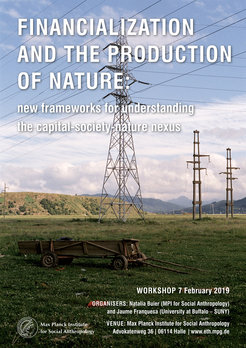The power of money: The interests of capitalism and the transformation of nature
On 7 February 2019 a workshop entitled “Financialization and the Production of Nature: new frameworks for understanding the capital-society-nature nexus” will take place at the Max Planck Institute for Social Anthropology (MPI). Workshop participants will examine how profit-oriented investments have influenced the global environmental transformations that are happening today. Anthropological case studies of large-scale energy and infrastructure projects in Germany, Italy, Spain, Greece, and China will form the empirical basis of the discussion. The workshop will be held in English.

The Capitalocene and the era of financial capitalism
Humans have always endeavoured to alter their environment and adapt it to suit their needs. What is new, however, is the degree to which this is happening and the speed of change. New, too, is the way that nearly all natural resources have become objects of profit-making for the global financial sector. Not everyone in the world is equally responsible for the development of this global phenomenon: the primary drivers are powerful actors in the capitalist economic and financial system. US sociologist Jason W. Moore popularised the term “Capitalocene” to capture the global dimensions of contemporary economic activity, and the concept has spurred discussions in academia and beyond.
Anthropological case studies of the transformation of nature and society
“Our workshop builds on this discussion of the effects of capitalist economy on nature,” explains Dr. Natalia Buier, Research Fellow in the group “Financialisation” at the MPI. “While debates about the Capitalocene have been largely theoretical, focusing on definitions and categories, we want to use our case studies of large-scale infrastructure and energy projects to reveal the concrete ways in which the interests of financial capitalism affect the environment and people’s everyday lives.” Taking the example of the high-speed rail network in Spain, Buier’s own research project examines how enormous investments into transport infrastructure influence the value and meaning of geographical and social spaces.
The former nuclear power station Greifswald – the fiction of a return to nature
The power of the energy sector and its continuing influence far into the future is the topic of Sergiu Novac (Central European University), who investigates the decommissioned nuclear power station in Greifswald. The example shows vividly the degree to which landscapes, material goods, and people are devalued by the nuclear industry, even as new and highly profitable business sectors emerge through the dismantling of the plant. At the same time, Novac describes the effects of the disposal of nuclear waste across generations: “The talk about the ‘greenfield’, the green, undeveloped land that is supposed to re-emerge after the demolition is complete, is a potent and dangerous fiction,” says Novac. Other case studies to be presented by workshop participants include: environmental problems and accompanying social consequences in the Italian industrial region Brindisi; the causes of the construction boom and its rapid collapse in Spain; and the many initiatives for transitioning to low-carbon energy consumption in China.
Studying global social change
The Max Planck Institute for Social Anthropology is one of the world’s leading centres for research in socio-cultural anthropology. It was established in 1999 by Chris Hann and Günther Schlee, and moved to its permanent buildings at Advokatenweg 36 in Halle/Saale in 2001. Marie-Claire Foblets joined the Institute as Director of the Department ‘Law & Anthropology’ in 2012. Common to all research projects at the Max Planck Institute is the comparative analysis of social change; it is primarily in this domain that its researchers contribute to anthropological theory, though many programmes also have applied significance and political topicality. Fieldwork is an essential part of almost all projects. Some 175 researchers from over 30 countries currently work at the Institute. In addition, the Institute also hosts countless guest researchers who join in the scholarly discussions.
Conference programme
More information on the research group “Financialisation”
Contact for this press release
Dr. Natalia Buier
Max Planck Institute for Social Anthropology
Department ‘Resilience and Transformation in Eurasia’
Advokatenweg 36, 06114 Halle (Saale)
Tel.: 0345 2927-270
E-mail: buier@eth.mpg.de
http://www.eth.mpg.de/buier
Prof. Dr. Chris Hann
Max Planck Institute for Social Anthropology
Department ‘Resilience and Transformation in Eurasia’
Advokatenweg 36, 06114 Halle (Saale)
Tel.: 0345 2927-200
E-mail: hann@eth.mpg.de
http://www.eth.mpg.de/hann
PR contact
Stefan Schwendtner
Press and Public Relations
Max Planck Institute for Social Anthropology
Advokatenweg 36, 06114 Halle (Saale)
Tel.: 0345 2927-425
E-mail: schwendtner@eth.mpg.de
http://www.eth.mpg.de
